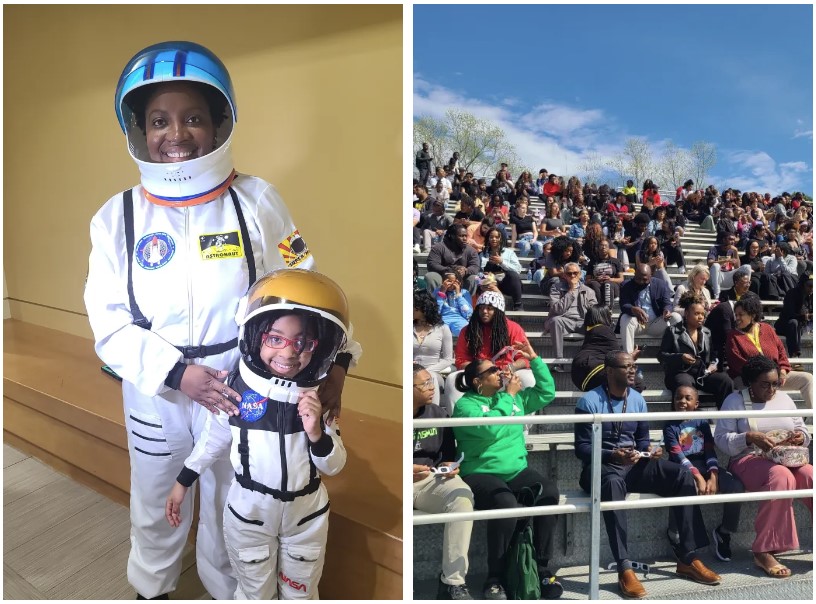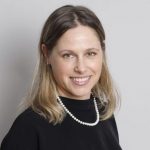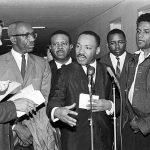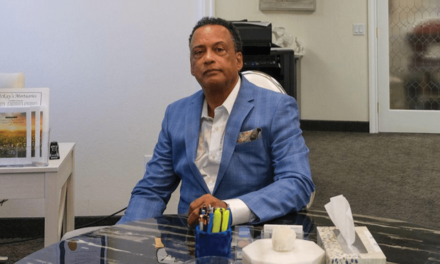By Deborah Bailey,
AFRO Contributing Editor,
dbailey@afro.com
Leave it to an HBCU to transform the 2024 solar eclipse viewing into a family reunion, homecoming- style celebration of Black excellence– all rolled into one event.
That’s exactly what Bowie State University did on April 8 as hundreds of students, faculty and staff, alumni and community members gathered at Bulldog Football Stadium to witness the 2024 solar eclipse on a Monday afternoon.


The brass section of the Bowie State band was turning up the volume and the cheering squad was on hand to greet students and guests piling into the football arena armed with solar viewing glasses.
They came in tee shirts and jeans, divine nine fraternity and sorority colors, and one mother and daughter team even came in matching astronaut gear. Melissa Duchene-Kelly, BSU faculty member and her daughter, Marley Kelly, celebrated the occasion in matching space suits.
“It’s not going to happen for another 20 years and in 20 years she’ll be in college,” Duchene-Kelly said about Marlene, her elementary school-aged daughter. Scientists predict that North Americans will have to wait until 2044 to see the next full solar eclipse– and they will have to travel to North Dakota or Montana to see it.
“She really loves astronomy–anything that has to do with outer space. She’s been asking every day, ‘Is this solar eclipse day?’ so we’re here and we’re ready,” said Duchene-Kelly.
More than 200 eclipse enthusiasts filled the stadium bleachers including music-tech senior, Grace Wilson, and Jasmine Elliot, a business administration junior.
“I’ve been into astronomy since elementary school so I thought it would be cool to see the solar eclipse,” said Wilson.
“I have to say this is an experience, it doesn’t happen a lot. I never want to take an experience like this for granted. I don’t know where I’ll be in 20 years when another eclipse comes to North America,” said Elliott.
Students like Wilson and Elliott were joined by scores of community members who joined the campus in eclipse viewing like Mayelle Guilliame, a 15-year-old from Northwestern High School who came with her brother and father for the experience.

“I thought it was very cool, and yes I was a little excited about it,” said the self-contained student who let out an audible gasp as the sky began to darken shortly after 3:00 p.m. Maryland was not in the path of “totality,” however the eclipse did cover up to 85 percent of the sun, according to NASA scientists who experienced the event with the Bowie State community.
NASA’s Kenneth Harris II, one of NASA’s youngest Senior Satellite Engineers, and Chidilim Okonkwo, director of NASA Financial Systems, joined the eclipse experience at Bowie State and offered students a complete history of the earth’s eclipses, a rundown of NASA’s current eclipse research projects and comprehensive safety guidance. They also took the opportunity to offer a pep talk and encouragement to students.
“You can impact someone else’s life just by your love of science. You never know what you’re going to spark in the next generation,” Harris said to the group just before the eclipse began.
“I was advised to drop out of engineering at one point in my journey,” said Harris, who went on to earn his Ph.D. in engineering and now works with his mentors, Alphonso Stewart, leader of Deployment Systems for NASA’s James Webb telescope.
Harris’ other mentor and co-worker is Kenneth Harris Sr., his father, who is also an engineer at NASA and the younger Harris’ lifelong role model. Both Stewart and Harris Sr. are Bowie State alumni, and the solar eclipse served as a sort of homecoming for those returning to the campus.
“This event is a bridge to connect Bowie State University and the community together,” Provost Guy-Alain Amoussou said to the crowd of students, family, friends and faculty gathered underneath the afternoon sky.
And with every gasp and hush of the crowd, a connection was indeed made.
Okonkwo, who travels the nation representing her agency at sites where NASA’s research and space flight projects are located, encouraged students to be proud of their identity. The Nigerian American, told students when she first came to NASA, many co-workers couldn’t even pronounce her name. Still, she persevered and arrived at Bowie on the day of the eclipse to deliver a message: “Be authentic to who you are.”
The post Connecting through science: Bowie State University brings solar eclipse viewing to HBCU community appeared first on AFRO American Newspapers.










